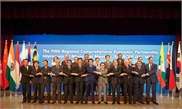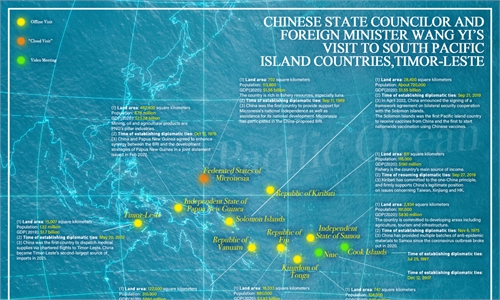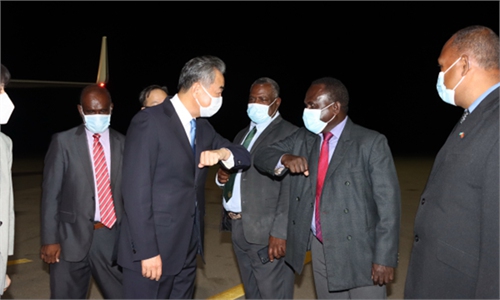Wang’s visit to Kiribati shows devt opportunities, injects firmness to one-China principle
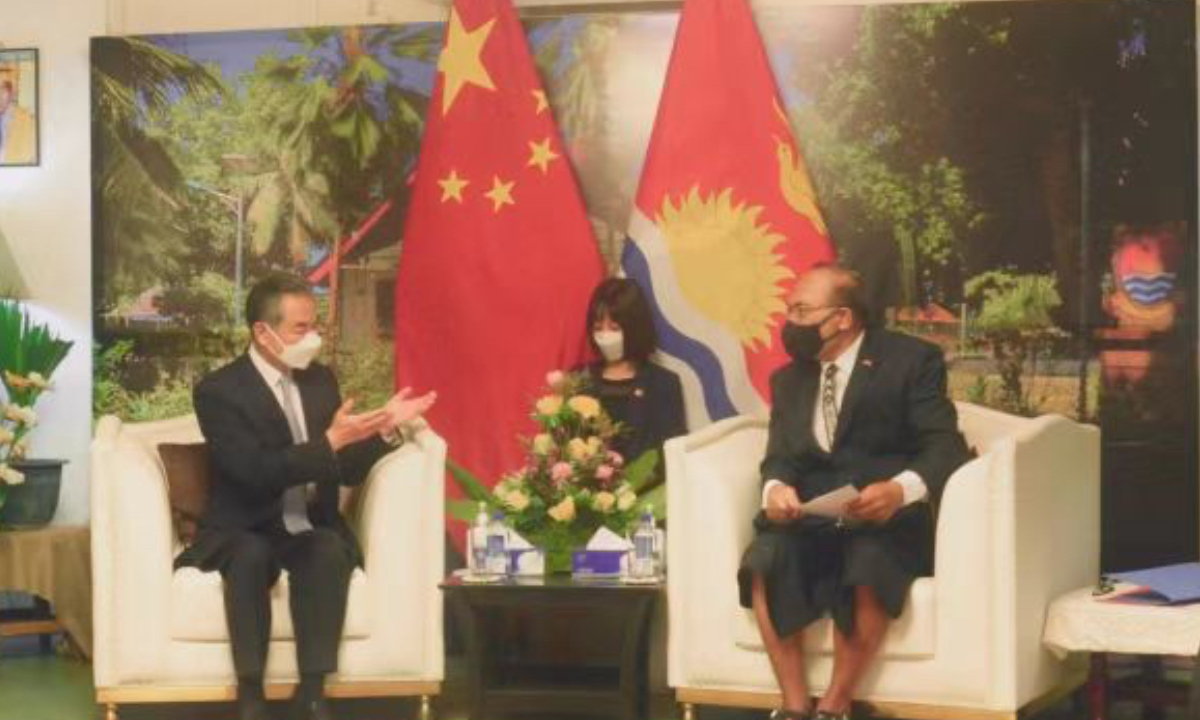
State Councilor and Foreign Minister Wang Yi (left) and Kiribati President Taneti Maamau (right) have a meeting on May 27, 2022. Photo: the website of Chinese Foreign Ministry
China and Kiribati underscored the remarkable achievements of bilateral cooperation in improving livelihood and economy of Kiribati since the two resumed ties in 2019, during Chinese State Councilor and Foreign Minister Wang Yi's visit to the South Pacific nation on Friday, vowing to further enhance cooperation in tackling climate change, COVID-19, and building Belt and Road Initiative (BRI) amid the US and Australia's intensified demonization of China's role in the region.
Wang's visit has injected more confidence and firmness in both the government and people of Kiribati for their historical decision to develop ties with China on the basis of recognizing the one-China principle, Chinese analysts said, noting more countries in the region will realize that developing ties with the world's second-largest economy will bring them unprecedented development opportunities to better integrate into global development, and will help them make independent decisions free of the Western countries' interference.
Wang arrived in Kiribati on Friday during an eight-nation tour in the South Pacific region. In a meeting with Kiribati President Taneti Maamau, Wang said the president regarded China as a true friend as he received the Chinese delegation at his home.
But the US and its allies have focused their efforts on containing China's development with the essence of not wanting to see non-Western forces succeed in the world and the enhanced cooperation of developing countries, Wang said, noting no one and no force can stand in the way of the development and revitalization of China and other developing nations.
President Maamau said the nation unswervingly adheres to the one-China principle and the resumption in bilateral ties with China proved the world is on the side of China and Kiribati is on the right side of history.
On September 27, 2019, China and Kiribati resumed diplomatic ties.
The president said the pragmatic cooperation between the two countries has yielded fruitful results and the livelihood of the people in Kiribati has improved, which strongly testified to China's sincere friendship.
The first batch of Chinese medical teams arrived in Kiribati along with the Chinese delegation to help the nation fight against COVID-19, and the two sides also agreed to enhance cooperation on tackling climate change, infrastructure, tourism and promote the BRI construction.
The broad cooperation deals between China and Kiribati did not contain a security deal or have any military significance that the US-led West had hyped, and analysts said it's the US that has been excessively focusing on the military value of the region but ignoring the needs of the local people.
Kiribati is of great strategic importance due to its location between Asia and America, and the US has long expected to develop it and other nearby countries into its military relay base and saw it as its sphere of influence, Song Zhongping, a Chinese military expert and TV commentator, told the Global Times. He noted that that's why the US does not want to see any cooperation between China and the regional countries.
Yu Lei, chief research fellow at the Research Centre for Pacific Island Countries of Liaocheng University, told the Global Times on Friday that the US has built large military bases and even strategic missile bases in Micronesia, Palau and the Marshall Islands, and Kiribati is located right behind the three countries where US built military bases.
"If China sets up a military base in Kiribati, the US' first and second island chains would be meaningless," Yu said.
However, China's cooperation in the region was purely for the livelihood of local people which was deeply welcomed.
Ambassador of Kiribati to China David Teaabo told the Global Times on Friday that China is an "understanding, true and trusted friend," not a destabilizer in the Pacific as some have claimed.
Tinian Reiher, an honorable member of Kiribati parliament, told the Global Times that Wang's visit is highly expected to bring more concrete benefits.
"Many people are saying that we are allowing China to compete with the US and Australia. But in fact, we moved back to China because we believe that it is a wise move and in the best interest of our people and future development, given China's global influence as the fast-developing nation with huge economic wealth and power," Reiher said.
Reiher said biased media reports hyping up a potential security pact between China and Kiribati is unreasonable and with ulterior motives.
Wang's trip to Kiribati was made after his trip to the Solomon Islands. The tour of Pacific islands will also take him to Samoa, Fiji, Tonga, Vanuatu, Papua New Guinea and East Timor. Wang will also visit Micronesia via video and have a virtual meeting with leaders of Cook Islands and Niue.
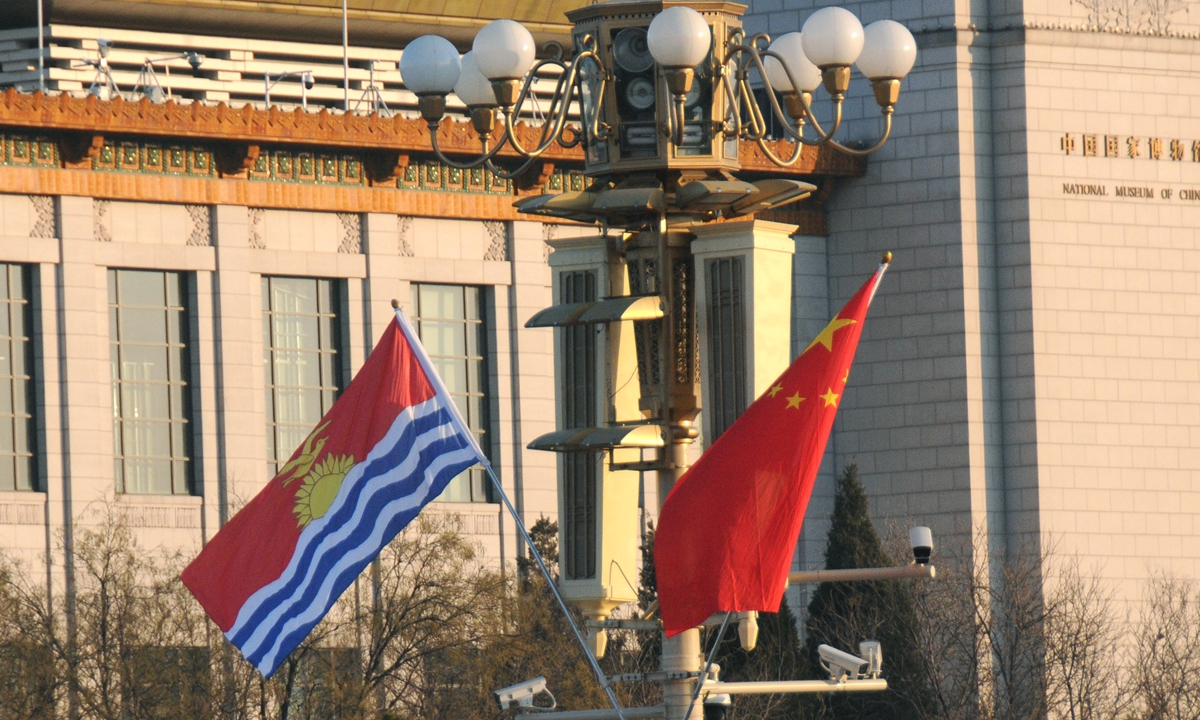
National flags of China and Kiribati Photo: VCG
Unease of Taiwan
The first two countries Wang visited in this trip were both Taiwan island's former "diplomatic allies," which cut off their "diplomatic relations" with Taiwan in 2019.
Taiwan was unease and anxious to see the deepening relations between Chinese mainland and the South Pacific region. The spokesperson for Taiwan's "foreign affairs department" on Thursday called on South Pacific countries to beware of the purpose of Chinese mainland government's help, and some Taiwan media quoted local scholars as saying it's time for Taiwan regional leader Tsai Ing-wen to reengage in various cooperation with the South Pacific region through the help of the US.
Chen Hong, president of the Chinese Association of Australian Studies, told the Global Times on Friday that Kiribati is a late comer in the South Pacific region's relations with China, but it has turned out to be a big achiever, and China's cooperation with Kiribati can serve as an exemplar to China's relations with other countries.
The Kiribati government and people have the wisdom to continue to stand at the right side of history as they know China never attempts to "buy" support and recognition with so-called "dollar diplomacy" as Taiwan's DPP authority has been doing, Chen said.
Taiwan media have revealed that the DPP spent heft amounts of money for its so-called foreign affairs activities each year to woo nations and maintain relations by taking advantage of US' influence.
Condescending attitude of Australia
China's moves in the South Pacific region also unsettled the US and its anti-China spearhead Australia, as the US sees South Pacific region a key component of its "Indo-Pacific Strategy," which is being pushed forward with full speed in Asia.
Fiji is joining the US' Indo-Pacific Economic Framework (IPEF), the White House said on Thursday, and Reuters said the move makes Fiji the first Pacific Island country in the plan that is part of a US effort to push back on China's growing influence.
In response, Chinese Foreign Ministry spokesperson Wang Wenbin said at Friday's media briefing that the Asia Pacific region is a highland for peaceful development and should not be turned into a geopolitical ground, and any initiative that truly benefits regional development should be open, inclusive and mutually beneficial instead of building walls to create division. This is the common aspiration of the South Pacific region.
Chen said the US attempted to incorporate the South Pacific region into an exclusive circle with the purpose to isolate China, and the imposition of the IPEF in the South Pacific is politically motivated to distance the local countries from their cooperation with China. Such attempts are irrational and bound to fail.
Australia's foreign minister Penny Wong threatened during a visit to Fiji on Friday, saying there were regional consequences to the Solomon Islands' security pact with China.
Chen said Australia seems to be headstrong to rush into competition and contestation with China in the South Pacific and Australia's new government seems to be still trapped in the Cold War mindset and ready for the engagement in a zero-sum rivalry with China.
In Suva, Penny Wong repeatedly talked about the "Pacific family," trying to play the "geography card" in her purported rivalry with China, Chen said.
"But one thing we still see amiss is a sense of equality and respect without self-interest. Australia still tries to play the role of the head of the family, which once again reveals its condescending attitude in the seemingly warm remarks," Chen said.
Some Australian media have also realized the hyping of "China threat" will not bring benefits to the region. Australia-based The Conversation published an opinion piece on Thursday, saying amplifying China threat narratives in South Pacific region "feeds into Australia's perceived need to compete by playing whack-a-mole with China," rather than by formulating a coherent, overarching regional policy that responds to the priorities of Pacific states.


